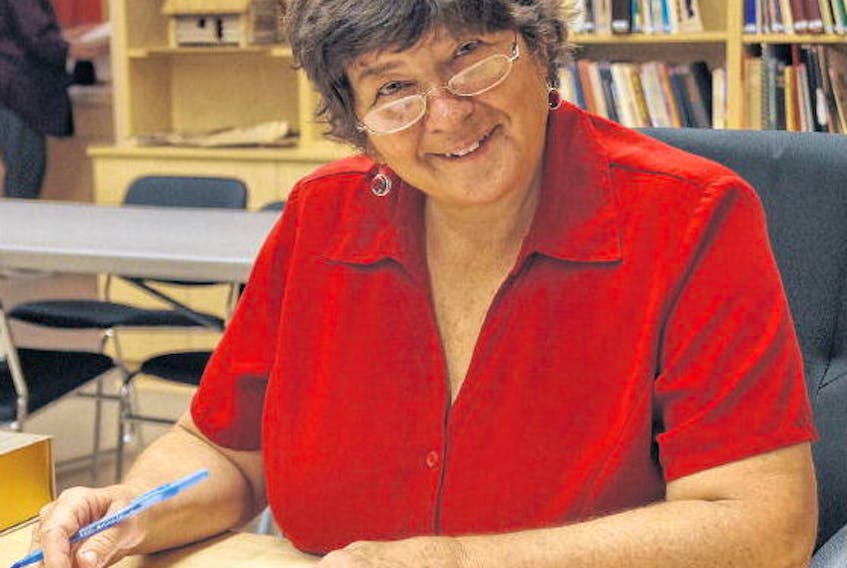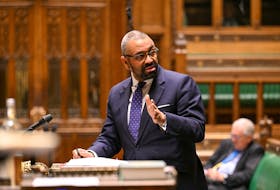Canadian authors and writers say they have a right to compensation when someone uses their work, and that includes its use in schools.
“It just sours me that anybody can think that writers should work for nothing,” said Monica Graham, a Pictou County author who has written nine non-fiction books.
Graham and the Writers’ Union of Canada, of which she is a member, say provincial education departments and school boards that have launched joint legal action against Access Copyright, the Canadian copyright licensing agency, are partly to blame.
Access Copyright distributes royalties from purchased work to Canadian authors and publishers.
Graham sees it as a pretty simple equation. By copying pages out of books, schools and other educational institutions save money by not having to buy them.
“That saves them some dimes,” Graham said. “Students don’t have to buy the book. Under Access Copyright, that money (saved) or a portion thereof would go back to the authors.”
Colin Bailey, communications director for the Council of Ministers of Education, declined to comment because the matter is before the courts, and said the council website tells its story.
The copyright consortium, composed of all Canadian education ministers except Quebec’s, believes the Copyright Act must balance two equally important sets of rights, according to the website. The first is the right of creators to control the use of their works and to receive compensation for that use. The second is the right of the education community to have fair access.
The council argues that Canada’s copyright law
became clearer and easier for teachers and students to follow in 2012 with the passage of federal legislation by Stephen Harper’s government and a Supreme Court decision the same year that changed the rules for the educational use of copyright- protected materials.
“A provision in the Copyright Act regarding the educational use of the internet allows students and teachers to use publicly available internet materials for their learning and educational pursuits without violating copyright,” the website says.
“The July 2012 Supreme Court decision clarified what fair dealing means in an education setting. According to that decision, teachers in Canada may make copies of short excerpts of a copyrightprotected work for students in their classes without having to obtain copyright permission or pay copyright royalties.”
The legislation and the court ruling convinced the consortium to make their case against Access Copyright in federal court.
While the education council wouldn’t comment, the writers have had plenty to say.
In a recent news release, the writers’ union called on the provincial ministries to immediately withdraw their suit and pay fair compensation for the hundreds of millions of pages of creative content copied in Canada’s schools.
“This is an outrageous attack on Canada’s writers,” union chairwoman Marjorie Doyle said in the release. “Authors in this country provide extraordinary value to education, and only ask to be fairly paid for their work. The copyright board has set a price for educational use of our work, and we feel this lawsuit from educational budget-makers is nothing more than their latest attempt to avoid legally determined costs.”
John Degen, the union’s executive director, said in the release the council’s lawsuit is on weak legal footing and “amounts to scare tactics and intimidation.”
“It has no hope of success. Provincial politicians simply want to drag this issue through the courts, hoping that legal expenses will cripple writers and publishers, forcing a settlement.
They are ignoring the copyright board and trying to cut costs at the expense of fair pay to Canadian writers.”
The union said poorly defined changes to the federal Copyright Act in 2012 prompted many Canadian schools and post-secondary institutions to adopt radically expanded copying practices, abandoning the established licensing structure that saw writers and publishers compensated for the use of their work.
“This development has cost Canada’s creative professionals tens of millions of dollars per year since 2012,” the union release says, reinstating a call for meaningful repair of the Copyright Act when Parliament reviews it this year.
Graham said with the 2012 revision, her piece of the copyright pie from educational institutions using her work has been cut by more than a third. In the past year, she earned about $800. She fears that the lawsuit, if successful, could cut that to zero.
She has written a long letter to Education Minister Zach Churchill in which she complains that “taking something without permission or recompense is theft.”
“It is stealing,” she wrote to the minister. “I currently earn poverty-level wages — yet I work hard, I have experience, and more than adequate education. My work has won awards. . . . My life’s work is not a hobby. Nor do I earn enough, even in a good year, to subsidize the educational system any more than my taxes already do.”
Graham said she would like to get the education minister’s perspective as to why the province is part of the lawsuit against writers.
“I would like to know why they think it’s OK,” she said. “I think they see this money going out and don’t understand what it’s for. ‘How dare they take this money from us.’ “It would be interesting to know what their rationale is. It outrages me.”









